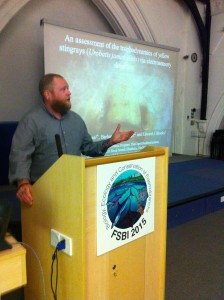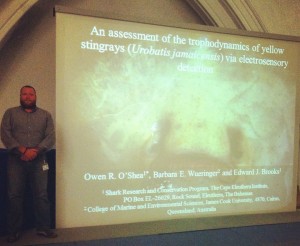
Plymouth University and the historical Marine Biological Association of the United Kingdom hosted the 2015 Fisheries Society of the British Isles annual conference. This year’s symposium theme was the biology, ecology and conservation of Elasmobranchs (sharks and rays). Dr. Owen O’Shea represented the Cape Eleuthera Institute and The Island School by presenting his work on electrosensory prey discrimination in a local species of round ray – Urobatis jamaicencis. This research was taught during applied scientific research class at The Island School in Spring 2014 and was warmly received by 178 leading shark researchers from across the globe. The plenary speeches were led by a range of well-respected and established scientists such as Greg Cailliet who spoke of advances in the ageing and growth of elasmobranchs, Sonja Fordham who is founder and president of Shark Advocates International spoke of the recent CITES listings and conservations challenges in the political arena and Greg Skomal discussed his work tagging great white sharks.
This work has contributed to the paucity of knowledge surrounding the efficiency at which rays search for food, considering their prey are often concealed beneath the sandy patches amongst reef habitat in which we find them. From this information, we can better understand how these animals are able to forage effectively in term of their energy budgets. This is important because yellow rays compete with other similar fishes for the bounty that lies beneath the sediments, and so maximizing foraging efficiency is critical not to get left behind!
 The conference offered an eclectic blend of talks ranging from remote camera systems following great white sharks, to the politics surrounding shark and ray conservations and the challenges faced in protecting many species. It was an honor to be a part of this conference and to not only share the work we do here at CEI, but to learn from our peers about their work, and hopefully forge future relationships and collaborations.
The conference offered an eclectic blend of talks ranging from remote camera systems following great white sharks, to the politics surrounding shark and ray conservations and the challenges faced in protecting many species. It was an honor to be a part of this conference and to not only share the work we do here at CEI, but to learn from our peers about their work, and hopefully forge future relationships and collaborations.